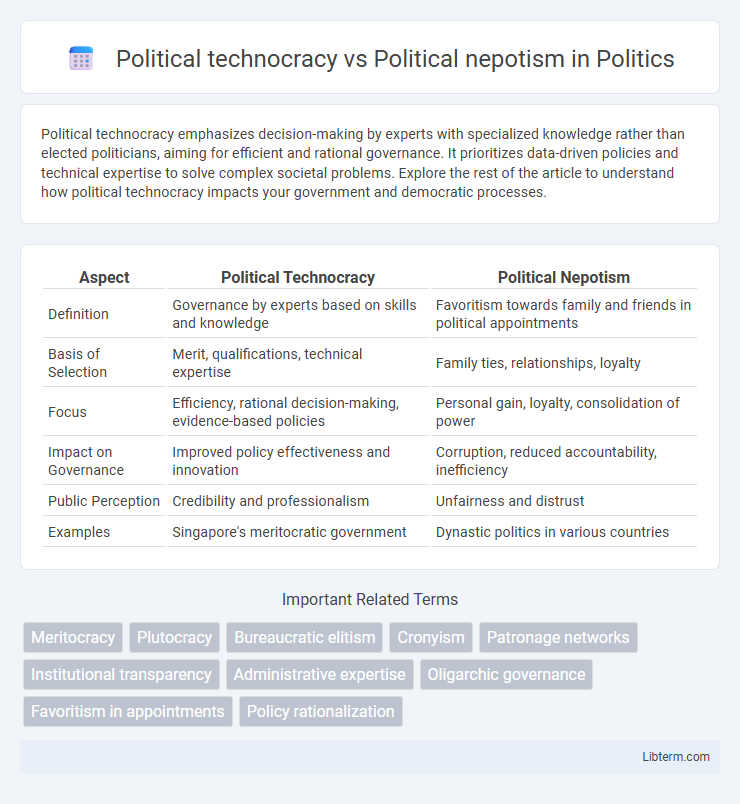Political technocracy emphasizes decision-making by experts with specialized knowledge rather than elected politicians, aiming for efficient and rational governance. It prioritizes data-driven policies and technical expertise to solve complex societal problems. Explore the rest of the article to understand how political technocracy impacts your government and democratic processes.
Table of Comparison
| Aspect | Political Technocracy | Political Nepotism |
|---|---|---|
| Definition | Governance by experts based on skills and knowledge | Favoritism towards family and friends in political appointments |
| Basis of Selection | Merit, qualifications, technical expertise | Family ties, relationships, loyalty |
| Focus | Efficiency, rational decision-making, evidence-based policies | Personal gain, loyalty, consolidation of power |
| Impact on Governance | Improved policy effectiveness and innovation | Corruption, reduced accountability, inefficiency |
| Public Perception | Credibility and professionalism | Unfairness and distrust |
| Examples | Singapore's meritocratic government | Dynastic politics in various countries |
Defining Political Technocracy and Political Nepotism
Political technocracy refers to governance led by experts and professionals who make decisions based on technical knowledge, data, and empirical evidence, prioritizing efficiency and rational policy implementation. In contrast, political nepotism involves favoritism in political appointments and decision-making, where power is concentrated within family ties or close personal relationships, often undermining meritocracy and institutional integrity. Technocracy emphasizes skill and expertise, while nepotism is characterized by preferential treatment that can erode public trust and governance effectiveness.
Historical Evolution of Technocracy and Nepotism in Politics
The historical evolution of political technocracy traces back to early 20th-century movements emphasizing expert governance and rational decision-making, particularly during the Progressive Era and post-World War II reconstruction, where specialists managed economic and social policies. Political nepotism, conversely, has ancient roots observable in monarchies and aristocratic systems, evolving through patronage networks in various political regimes where power was maintained through familial ties and favoritism. While technocracy gained prominence as a response to inefficiencies and corruption, advocating merit-based leadership, nepotism persists as a challenge undermining democratic processes and institutional integrity throughout history.
Key Differences: Meritocracy Versus Favoritism
Political technocracy emphasizes meritocracy by prioritizing expertise, qualifications, and specialized knowledge in governance, ensuring decisions are made based on competence and evidence. In contrast, political nepotism relies heavily on favoritism, where appointments and power are granted due to personal relationships or family ties rather than professional ability. This fundamental difference shapes the efficiency, transparency, and legitimacy of political systems, with technocracy fostering accountability and nepotism often breeding corruption and inefficiency.
Impacts on Governance and Policy-Making
Political technocracy emphasizes governance by experts with specialized knowledge, resulting in more evidence-based and efficient policy-making that often prioritizes long-term societal benefits. In contrast, political nepotism undermines governance quality by prioritizing loyalty and familial ties over competence, leading to corruption, reduced accountability, and policies that serve personal interests rather than the public good. The impact on governance is stark, with technocracy fostering transparency and innovation, while nepotism erodes institutional trust and hampers effective decision-making.
Public Perception and Trust in Leadership
Political technocracy often garners public trust due to its emphasis on expertise, data-driven decision-making, and merit-based leadership, which enhances perceived legitimacy and effective governance. In contrast, political nepotism typically erodes public confidence by prioritizing familial ties over qualifications, leading to suspicions of corruption, favoritism, and biased policies. The divergence in public perception significantly impacts citizens' willingness to support and engage with political institutions under each system.
Case Studies: Technocratic Leadership in Action
Technocratic leadership exemplifies governance driven by expertise, as seen in Singapore under Lee Kuan Yew, where data-driven policies fostered economic growth and social stability. Contrarily, political nepotism often undermines meritocracy, exemplified by the decline of the Marcos regime in the Philippines, where familial favoritism led to corruption and inefficiency. Case studies highlight technocracy's role in enhancing public trust through transparent, evidence-based decisions, contrasting sharply with nepotism's tendency to erode institutional integrity.
Case Studies: Nepotism in Political Systems
Political nepotism manifests prominently in case studies such as the Kenyatta family in Kenya, where power consolidation within kinship networks undermines democratic institutions and promotes corruption. In contrast, political technocracy prioritizes expertise and merit-based leadership, exemplified by Singapore's Lee Kuan Yew administration, which enhanced governance efficiency through technocratic appointments. Analysis of these case studies reveals how nepotism fosters governance inefficiencies and erodes public trust, while technocracy supports policy-driven decision-making and institutional stability.
Societal Outcomes: Innovation vs. Stagnation
Political technocracy fosters societal innovation through expert-driven decision-making that prioritizes evidence-based policies and long-term progress, leading to sustainable economic growth and technological advancements. In contrast, political nepotism often results in societal stagnation by promoting unqualified individuals based on familial ties, which undermines meritocracy and impedes effective governance. The divergence between these governance models significantly impacts social mobility, public trust, and the overall capacity for dynamic societal development.
Challenges and Criticisms of Both Systems
Political technocracy faces challenges related to potential disconnect from public needs, as decision-making prioritizes expertise over popular representation, often leading to criticisms of elitism and lack of accountability. Political nepotism struggles with nepotistic practices that undermine meritocracy, fostering corruption, inefficiency, and public distrust due to favoritism in appointments and resource allocation. Both systems face significant legitimacy issues, as technocracy risks alienating citizens through perceived technocratic authoritarianism, while nepotism erodes democratic principles by prioritizing personal relationships over competence.
The Future of Political Leadership: Towards Balance and Reform
The future of political leadership demands a balance between technocracy, where expertise and evidence-based decision-making drive governance, and the challenges posed by political nepotism, which undermines meritocracy and public trust. Reform efforts must prioritize transparent, accountable institutions that foster qualified leadership while minimizing favoritism and patronage. Emphasizing ethical standards and merit-based appointments will promote effective governance and sustainable political development.
Political technocracy Infographic

 libterm.com
libterm.com